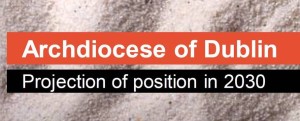 An Archdiocese of Dublin commissioned report has drawn attention to a link between the number of baptisms that the Church conducts and it schools rewarding pupil places on these grounds. In a frank investigation into the Archdiocese’s future position, the international consultancy firm Towers Watson predicted that the numbers attending mass would decline by a third by 2030, but that the number of baptisms conducted would remain steady, noting:
An Archdiocese of Dublin commissioned report has drawn attention to a link between the number of baptisms that the Church conducts and it schools rewarding pupil places on these grounds. In a frank investigation into the Archdiocese’s future position, the international consultancy firm Towers Watson predicted that the numbers attending mass would decline by a third by 2030, but that the number of baptisms conducted would remain steady, noting:
‘We have assumed that the annual number of baptisms will remain stable over the period to 2030. It should be noted that some of the strong correlation between baptisms and birth rates is likely to be due to the preference given to children who are baptised when enrolling in Catholic primary schools. If this requirement is removed at any point prior to 2030, we believe there is likely to be a decline in the number of baptisms each year.’ (p7)
The Archdiocese’s report is of direct relevance to practice in England and Wales, where baptism is similarly the most prevalent religiously selective oversubscription criterion employed by state funded Catholic schools. It also echoes the Church of England commissioned 2014 study ‘The Church Growth Research Programme Report on Strands 1 and 2‘, which cited religiously selective state funded Church of England schools as having potential to drive growth:
‘The results for church growth are interesting. Here the Church school has a key role … The most direct impact on attendance may be felt in areas where a popular C of E school is oversubscribed. Some churchgoing is clearly motivated by a desire to qualify for school admission, but the boost to attendance may last into the longer term if families decide to stay.’ (p23-24) ‘Middle class suburbs with church schools … offer great opportunities’ (p26)
Chair of the Accord Coalition, Rabbi Dr Jonathan Romain, said ‘The Archdiocese’s report acknowledges that religiously selective admission arrangements are being abused, and so highlights the need for strong school safeguards to deal with conflicts of interest between faith schools and their sponsors, with that of the wider society that funds the schools. The report is short cited however in not alerting the problem that issues such as religious cheating and privilege caused by religiously selective admission arrangements present to the Church itself.
‘Far from shoring up its position in society, the cheating and discrimination towards children serves to undermine its reputation and is self defeating. Groups that sponsor religiously selective state funded faith schools should realise that, ultimately, inclusivity serves everyone’s best interests.’
Notes
A link between religious selection and socio-economic selection, and its impact in boosting faith school performance, has long been established. Abuse of religiously selective admission arrangements has also been found to have a socio-economic bias.
A 2012 YouGov survey commissioned by The Sutton Trust found that 6% of all parents in Britain with a child at a state school admitted to attending church services that they would have not otherwise, so that a child could go to a Church School. Among parents of socio-economic group A this figure rose to 10%. A 2015 poll for ITV found 12.6% of parents admitted to ‘having pretended to practice faith in which they did not believe’ with the intention of gaining access to a school, suggesting that the prevalence of religious cheating may be increasing.
Data released by the Pastoral Research Centre in 2014 suggested that baptism may be being manipulated. The Centre showed that, while the number of baptisms of children under the age of one in England and Wales was in long term decline, the number of baptisms of those aged over one had risen quite dramatically over the previous decade. The change is consistent with parents instead having children baptised as the child gets nearer to school age, as part of a strategy to increase their chance of being admitted to a popular Church School.
The Archdiocese’s report, ‘Archdiocese of Dublin: Projection of position in 2030’, was produced in September 2015 and released last month. It can be found at http://www.dublindiocese.ie/wp-content/uploads/2016/01/Results-meeting-unprotected.pdf.


